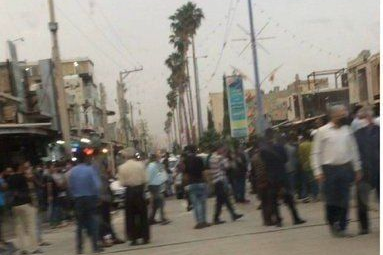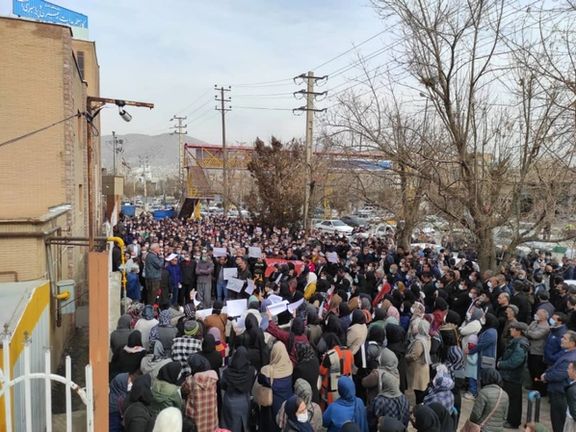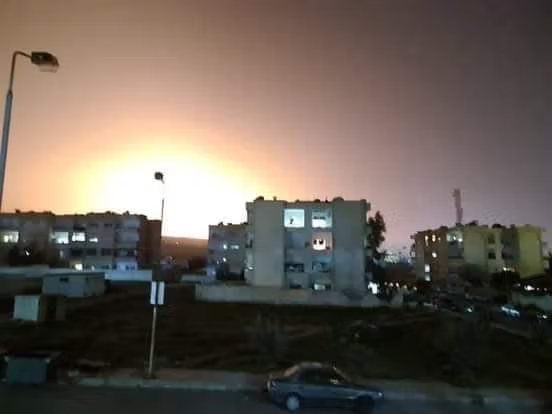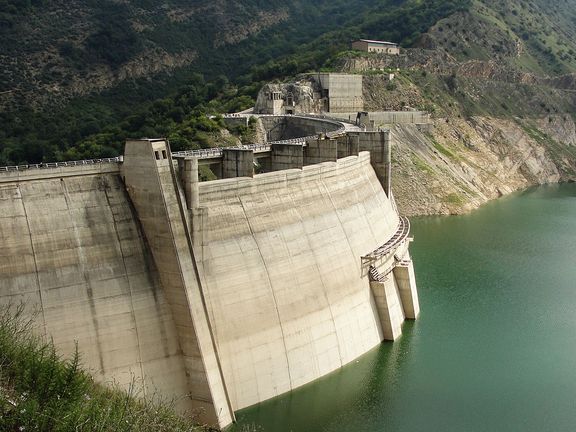Iran Cracks Down On Female Beauty Salons Over New Restrictions

Several female hairdressers have been arrested and others have been summoned in Iran’s over a new set of restrictions on activities of women’s beauty salons.

Several female hairdressers have been arrested and others have been summoned in Iran’s over a new set of restrictions on activities of women’s beauty salons.
According to information received by Iran International, in the northeastern city of Mashhad Women Hairdressers Union has recently announced a ban on a series of activities, including waxing of private parts, tattoos and piercing, injecting Botox and other cosmetic subdermal fillers, nail enhancements and eyelash extensions as well as “unconventional” dress code and playing western music at the salons.
A similar notification for the new bans has also been sent to female hairdressers in several other provinces of the country, threatening them with legal action if they do not comply.
In 2018, Iran also arrested dozens of people, including Instagram models and beauty salon owners, for posting photos online, and in 2007, police in Tehran closed dozens of barbershops and hairdressers in a fortnight as part of its crackdown aimed at enforcing Islamic dress codes among young Iranians.
Mashhad is home to numerous hardliner clerics who are against women’s presence in male dominated venues. Firebrand representative of the Supreme Leader in the city, Ayatollah Ahmad Alamolhoda has been banning concerts and cultural events for years.
Alamolhoda, who is father-in-law of President Ebrahim Raisi, has time and again urged people to reproach women with poorly-fitting hijab and admonish them, saying women with loose-fitting hijab should not feel secure in public.

Security forces in Iran are on high alert to prevent unrest over rising bread prices, as unrest has been reported in Khuzestan Province in the past two days.
According to some social media reports and videos, security forces used tear gas in Sousangerd and Izeh, Khuzestan, to disperse protesters Saturday evening. Social media users have also reported security forces' use of firearms and extensive arrests of activists in some cities of the oil-rich province.
Khuzestan has been the scene of widespread protests in the past few years. Protests over water shortage in July 2021 lasted for over a week during which at least eight protesters were shot dead by security forces.
For nearly three days, authorities have shut down or slowed down mobile internet access in some cities in Khuzestan including Sousangerd, Behbahan, Abadan, Ahvaz, and Hamidieh. Internet disruption came after a call to protest began circulating on social media Thursday.
Security forces have a visible, large presence in various towns and cities of Khuzestan, the reformist Eslahat News reported Sunday. The website also said local authorities are not offering any explanation for the disruption to the internet and text messaging services.
Verifying the reported protests in Khuzestan cities since Thursday has proved difficult as very few videos have been distributed. By shutting down mobile internet and reducing the speed of broadband, authorities have ensured videos of protests will not spread on social media or be shown by foreign-based media outlets.
The Student Basij, a pro-government student union affiliated with the Revolutionary Guard, warned President Ebrahim Raisi Thursday that the abrupt end to flour subsidy could cause unrest. "The society is not prepared for this level of price increases and this level of disorganization in its execution," the union said in a letter to Raisi.
The hike in the price of bread is a result of a government decision to scrap the subsidy for imported wheat, flour and other essential items. The higher cost of flour is also affecting a wide variety of breads, cakes and pastries including children's snacks, fast food such as hamburgers and sandwiches, and traditional soup noodles.
A video showing protests in Khuzestan on Saturday
Authorities have been making contradictory statements about the new prices, manner of direct payment of cash subsidies to people for bread, and the time of the implementation of their plans.
In a meeting with representatives of businesses and trade associations Saturday evening, Raisi denied having any secret plans to remove the subsidies of basic commodities and insisted that he only wants to reform the subsidy system, giving the money directly to people to prevent alleged corruption.
"People [in Khuzestan] are angry because they don't know what is happening and the authorities are not talking [about their plans], or even worse, making unacceptable excuses," an unnamed civil activist told Emtedad News.
"One of the justifications for the hike in bread prices was claiming it was being smuggled [to neighboring countries] which was very senseless and angered people even more," he said referring to officials' claim that increasing the price would prevent smuggling of flour and flour-based products such as pasta to neighboring countries where they are much more expensive than in Iran.
Some politicians and experts on Sunday mocked the government claim of trying to prevent smuggling, saying that this is an excuse often used by officials to justify their own economic failures.

Retirees and pensioners of Iran’s Social Security Organization staged protest rallies in several Iranian cities on Sunday, amid worsening economic conditions.
According to the US-based Human Rights Activists' News Agency (HRANA), the demonstrations were held at provincial offices of the organization in Tabriz, Ahvaz, Mashhad, Kermanshah and some others.
Retirees are protesting against meager pensions, issues in their medical insurance services and poor living conditions in general. The steep fall in the value of Iran’s currency has slashed the purchasing power of retirees and workers.
Similar protest rallies have also been held in various cities in the past few days by various other groups, including ranchers, farmers, miners, and teachers.
On Saturday, ranchers in at least 10 cities gathered at the offices of the Agriculture Ministry, miners from the northern Mazandaran province held a rally in front of Iran’s Mineral Processing and Processing Company in Tehran, and workers of Gachsaran petrochemical company in Kohgiluyeh and Boyer-Ahmad Province staged a strike.
People in several towns of the southwestern Khuzestan province also held demonstrations against the rise in bread prices.
Moreover, the Coordination Council of Iranian Teachers’ Trade Associations issued a statement Sunday saying if teachers detained in the past two weeks are not released, they will hold another nationwide protest.
Several teachers and union activists were arrested before, during and after the latest round of protests across the country on May 1, the international Labor Day.
People from different walks of life, including teachers, nurses, firefighters, and even staff members of the judiciary department and prison guards, have protested or gone on strikes to demand higher salaries.

Following the shutdown of internet connection after popular protests over bread prices in southwestern Iran, a former US official has called on Elon Musk to activate Starlink satellite access for Iranians.
Victoria Coates, who served as senior advisor to the energy secretary in the Trump administration, said in a tweet on Saturday that if Musk can provide internet via satellite constellation Starlink for the Ukrainians, “why can't we blast it into Khuzestan and let these brave Iranians communicate?”
Since Friday morning, internet connection was shut off or significantly slowed down in oil-rich province of Khuzestan, a development usually signaling protests in Iran.
Authorities disrupt the Internet to prevent news of unrest reaching the rest of the country and abroad. It is also done to prevent protesters from galvanizing support in nearby regions.
Operated by Elon Musk’s company SpaceX, Starlink provides internet access coverage to most of the Earth. As Ukraine's internet service has been disrupted by Russia's invasion, Musk made internet available in the country in February.
Following the move by Musk, Iran’s former communication minister Mohammad-Javad Azari-Jahromi warned Iran’s parliament against plans to restrict Internet access, saying that “if you do not provide people with the right service, others will”.

Unknown aircraft Saturday attacked positions of Iran-backed forces in and around Syria’s eastern city of Deir ez-Zor for the second time this week.
The Syrian Observatory for Human Rights (SOHR) said, “Several explosions took place on Saturday in Deir ez-Zor city and its vicinity which are under the control of the regime and Iranian-affiliated militia."
Unidentified warplanes carried out airstrikes against targets in Hawijah Kate and a nearby bridge in the northern part of Deir ez-Zor city, the SOHR said.
Israel frequently targets forces under Iranian command in Syria to prevent the Islamic Republic from accumulating weapons and entrenching itself further in the war-torn country.
Al-Arabiya, however, quoted sources as saying that American drones had launched the attack.
Israel’s military does not usually comment on specific strikes in Syria but has acknowledged that it has conducted hundreds of attacks against Iran-backed groups. It has also claimed several attacks on arms shipments believed to be bound for Hezbollah forces or other Iran-linked groups there.
Last month, Israel allegedly carried out three strikes in Syria.
According to Syrian state media, the latest attack was on April 27, when surface-to-surface missiles were fired from northern Israel at military positions near capital Damascus, killing four Syrian soldiers and injuring three others.
In March, an Israeli attack over the Syrian capital Damascus killed two officers from Iran’s Revolutionary Guard and left some material damage.

Water inflow into Tehran dams has decreased by about 27 percent since the start of the wet season, in Iran which started in November.
Mohammad-Reza Bakhtiari, the managing director of Tehran province Water and Wastewater Company, said on Saturday that input of the five dams around the capital has decreased to over 620 million cubic meters, while the figure was about 855 million cubic meters in the same period last year.
He added that the current volume of water reserve in Amir Kabir, Latian, Lar, Taleghan and Mamlu dams is 97, 60, 67, 232 and 71 million cubic meters, respectively.
According to Bakhtiari, rainfall was also down 31 percent from the beginning of the wet season to 164.1 millimeters, down from 218.9 millimeters in the same period last year.
Head of Iran's Geological Survey and Mineral Explorations Organization, Alireza Shahidi, has recently said that the country is in a 30-year drought cycle, noting that the dry spell started about 10 to 20 years ago and now its effects are more observable.
In 2021, large-scale water protests took place in two important provinces, Khuzestan and Esfahan, with several people killed and hundreds injured by security forces.
As drought persists, more underground water is exploited for irrigation, depleting natural reservoirs formed during thousands of years. However, politicians and experts say that there are no consistent government plans to deal with the water crisis, which can result in mass migration of millions of people in the next ten years.